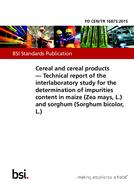Click here to purchase
BS PD CEN/TR 16875:2015: The term impurities applies to all components of a grain sample that differ from the normal basic cereal.It includes the following groups: broken grains, other cereals, grains damaged by pests, grainsoverheated during drying, sprouted grains, extraneous seeds, unsound grains, extraneous matter andimpurities of animal origin.
The principle of the determination of impurities content is to separate all the groups of impurities fromthe normal basic cereal grains of unimpaired quality by sieving and manual selection out of a subsampleand to quantify them. There are various problems in the determination of impurities:
Firstly, the identification of the different groups of impurities depends strongly on the experience andthe knowledge of the investigator.
Also experienced investigators can differ in their characterization of grains.
Finally, one is faced with the fact that grain, even after mixing, is rarely homogenous. In other words, if asample was divided by a sample divider into a number of portions, the amount of a specific group ofimpurities in each portion could be different, even if absolutely no human or machine error occurred ineach determination.
These problems will result in variation of the results of the determination.
An international interlaboratory test for the determination of impurities, according to this standard andinvolving 14 laboratories in 4 countries, was carried out with 5 maize and 3 sorghum samples. It wasasked to participants to make determination in duplicate.
Ten laboratories reported results for the complete sample set and two only for corns.
The test materials ranged between:
- 0,0 % and 2,7 % for broken grains;
- 0,2 % and 3,5 % for grain impurities;
- 0,0 % and 0,1 % for sprouted grains;
- 0,5 % and 3,3 % for miscellaneous impurities;
- 1,8 % and 8,7 % for total impurities.
The aim of the study is to determine the precision, repeatability and reproducibility of the method ofdetermination of impurities content in maize and sorghum samples.
The analyses were realized in March – April 2011.
It occurs according to ISO 5725:1994.
Cross References:
EN 16378
All current amendments available at time of purchase are included with the purchase of this document.
Product Details
- Published:
- 09/30/2015
- ISBN(s):
- 9780580899638
- Number of Pages:
- 24
- File Size:
- 1 file , 1.3 MB
- Product Code(s):
- 30322084, 30322084, 30322084
